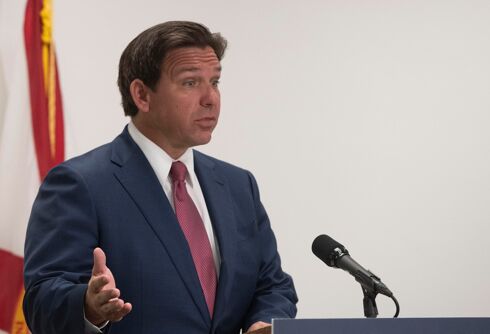
Update: 3:00 p.m. MST
PHOENIX — Same-sex marriage became legal in Arizona on Friday, a sharp turn for a state that became ground zero in the clash over gay rights less than a year ago when the state Legislature passed a bill allowing businesses to deny service to gays and lesbians.
Same-sex couples lined up to marry at the courthouse in downtown Phoenix immediately after Attorney General Tom Horne announced that the state wouldn’t challenge a federal court decision that cleared the way for same-sex unions in the state.
David Larance and Kevin Patterson, who were among the couples who sued to overturn Arizona’s ban, reflected on the effect of the ruling. “The best way I can describe it, is that it gives me such peace of mind,” Patterson said, choking back tears.
Shortly after, they were married to cheers on the courthouse lawn. “This is a great day,” Patterson said. “I never thought this would happen in Arizona.”
The decision bookends two weeks of nonstop court rulings across the nation, with judges striking down bans on same-sex unions and conservative state officials pushing back in a struggle that has increasingly gone in favor of gay marriage supporters.
Since Oct. 6 – when the U.S. Supreme Court let stand rulings that struck down gay marriage bans – same-sex couples have begun to wed in several new states.
In the West, for example, couples have since tied the knot in Alaska, Arizona, Idaho and Nevada, making Montana the lone state under the jurisdiction of the 9th U.S. Circuit Court of Appeals where same-sex couples haven’t legally wed.
The federal government, meanwhile, announced Friday morning that it will recognize same-sex marriages in seven new states and extend federal benefits to those couples, which brings the total number of states where gay and lesbian unions have federal recognition to 26, plus the District of Columbia.
Based on the flurry of recent court decisions, including Arizona’s ruling Friday, more than 30 states now extend marriage rights to gay couples, and cases are pending in several others.
Arizona’s governor, Jan Brewer, said in a statement that federal courts have thwarted the will of voters and eroded the state’s power to regulate laws.
“Simply put, courts should not be in the business of making and changing laws based on their personal agendas,” Brewer said. “It is not the role of the judiciary to determine that same-sex marriages should be allowed.”
The issue has long been a source of tension in Arizona. Nearly eight months ago, Brewer vetoed the bill…

Rick Scuteri, AP
The issue has long been a source of tension in Arizona. Nearly eight months ago, Brewer vetoed the bill that would have protected people who assert their religious belief in refusing service to gays. It would have allowed people to claim their religious beliefs as a defense against claims of discrimination. Critics called it an open attack on gay people, saying said it could allow people to break nearly any law and cite religious freedom as a defense.
The proposal set off a national debate over religion and discrimination. Companies such as Apple Inc. and American Airlines urged Brewer to veto the bill, saying it would hurt the state and could alienate businesses looking to expand there.
Horne, meanwhile, said he’s done all he could to defend the ban and that further court wrangling would waste taxpayer dollars.
Article continues below
The decision from U.S. District Judge John Sedwick bars Arizona officials from enforcing a 1996 state law and a 2008 voter-approved constitutional amendment that outlawed gay marriage.
Lawyers who pushed lawsuits challenging the state’s gay marriage ban argued the state law violated equal protection and due process rights and wrongfully denied their clients the benefits of marriage, such as spousal pension benefits, spousal survivorship rights and the ability to make medical decisions for each other.
Attorneys representing the state urged Sedwick to uphold the state’s definition of a marriage as a union between a man and woman. They argued the ban furthers the state’s interest in connecting a child to his or her biological mother and father and that voters and lawmakers enacted the ban to protect their right to define marriage for their community.
After the attorney general said the state would not fight to stop weddings, a crowd of about a dozen gay couples cheered and rushed into the clerk’s office, smiling and hugging.
Michael K. Jeanes, the clerk who oversees the state’s most populous county, which includes Phoenix, tweeted immediately after the ruling: “Welcome All to the Clerk’s Office. Your marriage license awaits and we are ready to serve you!”
This material may not be published, broadcast, rewritten, or redistributed.
Statement by Arizona Attorney General Tom Horne on decision not to appeal:
Developing story. This report will be updated.“The decision I make today has to be based on legal considerations rather than policy considerations. I believe the first duty of the Attorney General is to be a good lawyer.
Lawyers live under a rule called Rule 11, which provides that it is unethical for a lawyer to file a pleading for purposes of delay rather than to achieve a result.
The probability of persuading the 9th circuit to reverse today’s decision is zero. The probability of the United States Supreme Court accepting review of the 9th circuit decision is also zero.
Therefore, the only purpose to be served by filing another appeal would be to waste the taxpayer’s money. That is not a good conservative principle.
I have decided not to appeal today’s decision, which would be an exercise in futility, and which would serve only the purpose of wasting taxpayers’ money.
I am issuing a letter today to the 15 county clerks of court with the directive that based on today’s decision by the Federal District Court, they can issue licenses for same sex marriages immediately.”













